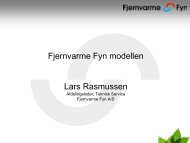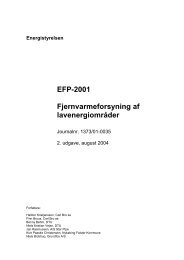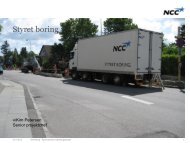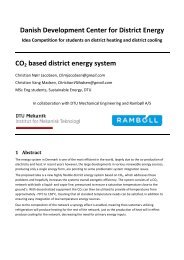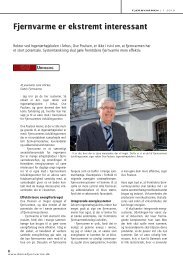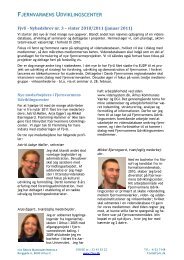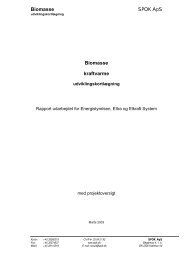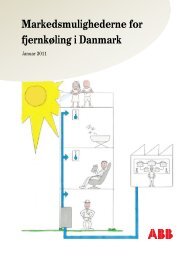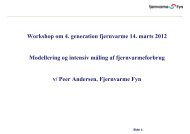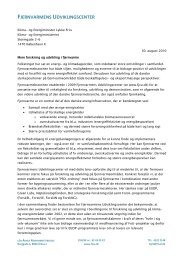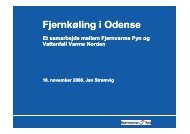12th International Symposium on District Heating and Cooling
12th International Symposium on District Heating and Cooling
12th International Symposium on District Heating and Cooling
You also want an ePaper? Increase the reach of your titles
YUMPU automatically turns print PDFs into web optimized ePapers that Google loves.
The <str<strong>on</strong>g>12th</str<strong>on</strong>g> <str<strong>on</strong>g>Internati<strong>on</strong>al</str<strong>on</strong>g> <str<strong>on</strong>g>Symposium</str<strong>on</strong>g> <strong>on</strong> <strong>District</strong> <strong>Heating</strong> <strong>and</strong> <strong>Cooling</strong>,September 5 th to September 7 th , 2010, Tallinn, Est<strong>on</strong>iaDISTRICT HEATING AS PART OF THE ENERGY SYSTEM:AN ENVIRONMENTAL PERSPECTIVE ON ‘PASSIVE HOUSES’AND HEAT REPLACING ELECTRICITY USEMorgan Fröling 1,2 <strong>and</strong> Ingrid Nyström 31Engineering <strong>and</strong> Sustainable Development, Mid Sweden University, Östersund, Sweden2 Chemical Envir<strong>on</strong>mental Science, Chalmers University of Technology, Göteborg, Sweden3 CIT Industriell Energianalys, Göteborg, SwedenABSTRACTEnergy use for space heating, hot tap water <strong>and</strong> otherheat use at comparatively low temperature levelsrepresent a substantial part of the total energy use inSweden <strong>and</strong> countries with similar climate. It is thus ofimportance to meet this dem<strong>and</strong> in a way generating assmall envir<strong>on</strong>mental impact as possible. However, it ispossible to create a system with higher envir<strong>on</strong>mentalimpacts with energy efficient buildings compared toless energy efficient buildings through choice of lessgood energy carriers. It is not enough that theindividual parts of a system are good <strong>and</strong> efficient togive a low envir<strong>on</strong>mental impact; the parts must bec<strong>on</strong>nected into the system in a good way.From envir<strong>on</strong>mental perspective energy efficientbuildings <strong>and</strong> district heating d<strong>on</strong>‘t oppose each other– good parts c<strong>on</strong>nected in a good system will give anoptimal. The results from the study of the three items ofhousehold equipment show possibilities for districtheating to be an alternative with good envir<strong>on</strong>mentalperformance, but not under all heat generati<strong>on</strong>regimes.INTRODUCTIONIt is of importance to meet for space heating, hot tapwater <strong>and</strong> other heat use at comparatively lowtemperature levels in a way generating as smallenvir<strong>on</strong>mental impact as possible. This can be d<strong>on</strong>e byincreasing the efficiency in the use phase <strong>and</strong> in theheating systems of buildings as well as through heatgenerati<strong>on</strong> systems with low envir<strong>on</strong>mental impact.During recent years there has been a focus <strong>on</strong> houseswith low need of space heating, low energy houses or―passive houses‖. In such buildings the heat from theincoming sun radiati<strong>on</strong> together with body heat frompeople living in the houses <strong>and</strong> different householdequipment will cover the whole or at least substantialparts of the space heating need over a year (extraheating might be needed during the coldest days of ayear). Hot tap water still need to be heated. For parts ofthe year this can be achieved by solar panels, but thereis a need for extra heating during winter. This mightresult in the extra heating dem<strong>and</strong> being covered byelectricity, directly or indirectly.Increased energy efficiency is in itself a desirable goalfor a society – it increases the robustness of the energysystem <strong>and</strong> the possibilities for a resource efficient <strong>and</strong>more sustainable energy system in the l<strong>on</strong>g run.However, it is possible to create a system with higherenvir<strong>on</strong>mental impacts with energy efficient buildingscompared to less energy efficient buildings throughchoice of less good energy carriers. It is not enoughthat the individual parts of a system are good <strong>and</strong>efficient to give a low envir<strong>on</strong>mental impact; the partsmust be c<strong>on</strong>nected into the system in a good way.Thus it is important to identify system soluti<strong>on</strong>s thatavoids sub optimizati<strong>on</strong> <strong>and</strong> gives us energy efficientbuildings <strong>and</strong> an efficient energy system with goodenvir<strong>on</strong>mental performance.In a synthesis studies within the framework ofChalmers Energy Center [1] the role of district heatingin a future society with more energy efficient buildingshave been investigated. Here we report <strong>on</strong> generalfindings of this study with a special focus <strong>on</strong> theenvir<strong>on</strong>mental performance of the possibility to c<strong>on</strong>vertsome household electricity use into district heating - forthe use in dish washers, washing machines <strong>and</strong> tumbledriers [2]. The envir<strong>on</strong>mental performance is studiedusing life cycle assessment methodology <strong>and</strong> differentassumpti<strong>on</strong>s regarding electricity <strong>and</strong> district heatinggenerati<strong>on</strong>.DISTRICT HEATING – DEMAND SIDEThere are today several drivers in the directi<strong>on</strong> of lowertotal heat market for district heating in future [1].Am<strong>on</strong>g possible such drivers in Sweden are:Warmer climate (due to climate change)Higher energy pricesIncreased envir<strong>on</strong>mental awarenessIncreased energy efficiency of existing buildingstockLimited amounts of new housingNew housing more energy efficientHowever, there are also possible drivers for a largerheat market in future, e.g.:Increased wealth giving larger living space perpers<strong>on</strong> <strong>and</strong> higher dem<strong>and</strong>s <strong>on</strong> comfort202



